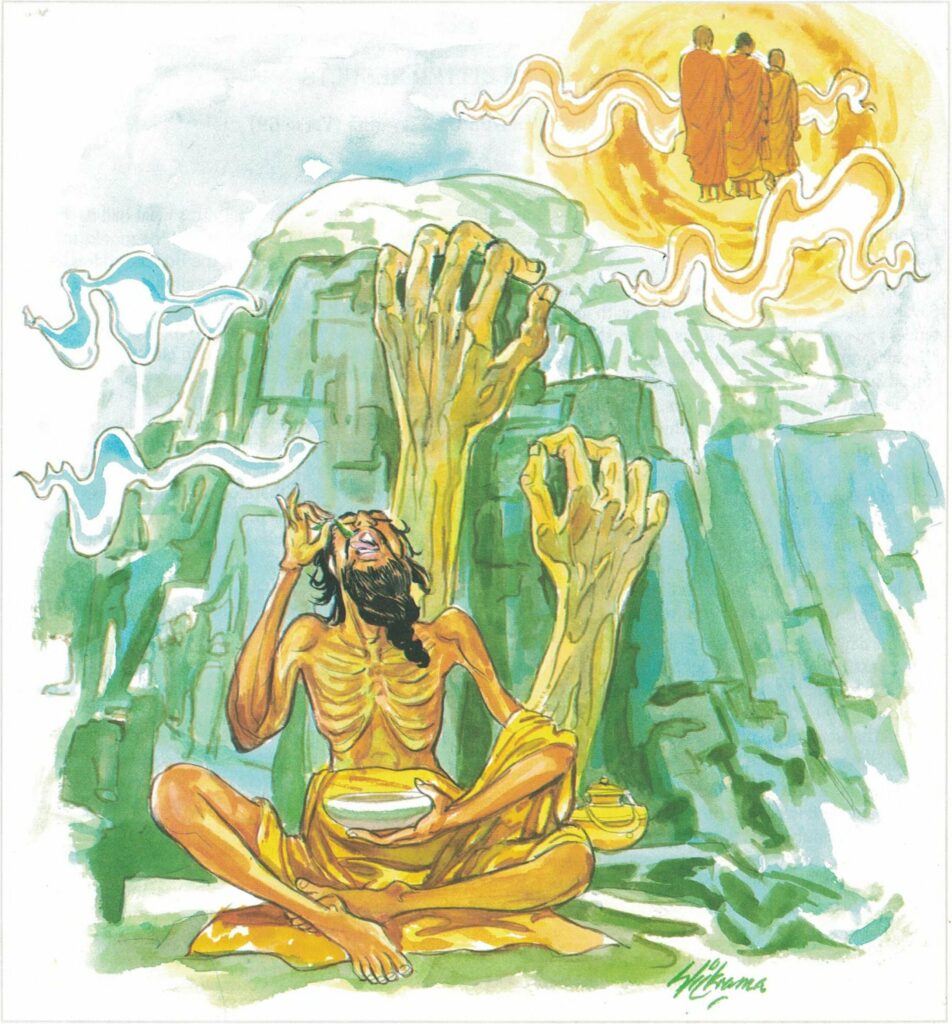Pali text, illustration and English translation of Dhammapada verse 70:
māse māse kusaggena bālo bhuñjetha bhojanaṃ |
na so saṅkhatadhammānaṃ kalaṃ agghati soḷasiṃ || 70 ||
70. Month after month with blade-grass tip the fool may take his food; he’s not worth the slightest bit of one who Dhamma knows.

The Story of Monk Jambuka
While residing at the Jetavana Monastery, the Buddha spoke this verse, with reference to Venerable Jambuka.
Jambuka was the son of a rich man in Sāvatthi. Due to his past evil deeds he was born with very peculiar habits. As a child, he wanted to sleep on the floor with no proper bed, and take his own excrement for food instead of rice. When he grew older, his parents sent him to the ājivakas, the naked ascetics. When those ascetics found out about his peculiar food habits they drove him away. In the nights he ate human excrement and in the day time stood still on one leg and kept his mouth open. He used to say that he kept his mouth open because he only lived on air and that he stood on one leg because it would otherwise be too heavy for the earth to bear him. “I never sit down, I never go to sleep,” he boasted and on account of this, he was known as Jambuka, a jackal.
Many people believed him and some would come to him with offerings of choice food. Then Jambuka would refuse and say, “I do not take any food except air.” When pressed, he would take just a little of the food with the tip of a blade of grass and say, “Now go, this little food will give you enough merit.” In this way, Jambuka lived for fifty-five years, naked and taking only excreta.
One day, the Buddha saw in his vision that Jambuka was due to attain arahatship within a short time. So, in the evening, the Buddha went to where Jambuka was staying and asked for some place to spend the night. Jambuka pointed out to him a mountain-cave not far from the stone slab on which he himself was staying. During the first, second and third watches of the night, the Cātummahārājikā devās, Sakka and Mahābrahma came to pay homage to the Buddha in turn. On all the three occasions, the forest was lit up and Jambuka saw the light three times. In the morning, he walked over to the Buddha and enquired about the lights.
When told about the devās, Sakka and Mahābrahma coming to pay homage to the Buddha, Jambuka was very much impressed, and said to the Buddha, “You must, indeed, be a wonderful person for the devās, Sakka and Mahābrahma to come and pay homage to you. As for me, even though I have practiced austerely for fifty-five years, living only on air and standing only on one leg, none of the devās, nor Sakka, nor Mahābrahma has ever came to me.” To him, the Buddha replied “O Jambuka! You have been deceiving other people, but you cannot deceive me. I know that for fifty-five years you have been eating excrement and sleeping on the ground.”
Hearing that, Jambuka was horrified and terror-stricken, and repented for having done evil and for having deceived other people. He went down on his knees and the Buddha gave him a piece of cloth to put on. The Buddha then proceeded to deliver a discourse; at the end of which Jambuka attained arahatship and joined the Buddhist Sangha.
Soon after this, Jambuka’s pupils from Anga and Magadha arrived and they were surprised to see their teacher with the Buddha. Venerable Jambuka then explained to his pupils that he had joined the Buddhist Order and that he was now only a disciple of the Buddha. To them, the Buddha said that although their teacher had lived austerely by taking food very sparingly, it was not worth even one-sixteenth part of his present practice and achievement.
Explanatory Translation (Verse 70)
bālo māse māse kusaggena bhojanaṃ bhuñjetha
so saṅkhatadhammānaṃ soḷasiṃ kalaṃ na agghati
bālo: the ignorant person; māse māse: once a month; kusaggena: with the tip of a grass blade; bhojanaṃ [bhojana]: food; bhuñjetha: eats; so: (but) he; saṅkhatadhammānaṃ [saṅkhatadhammāna]: of the attainment of the unconditioned; soḷasiṃ kalaṃ [kala]: at least one-sixteenth; na agghati: is not worth
A foolish person sets out to attain the highest reward of spiritual life. As an austere ascetic, he eats a mere morsel of food with the tip of a blade of grass. And, that too, once a month. Still that kind of misguided ascetic will not at all be nearer liberation than when he started. With all that, he is not worth even one-sixteenth part of an Arahant who has achieved the Unconditioned.
Commentary and exegetical material (Verse 70)
kusaggena bhojanaṃ: even if a tiny morsel of food is taken with the tip of a blade of grass. This verse refers to those who practice extreme austerities and self-mortification. The Buddha, quite early in his Teachings, discounted austerities as a means of realizing the truth.